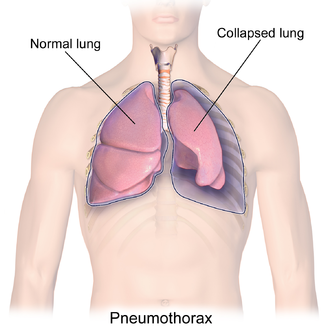Difference between revisions of "Pneumothorax"
Jump to navigation
Jump to search
(+SO) |
|||
| Line 40: | Line 40: | ||
The emphysema present may be a contributory factor; however, other causes | The emphysema present may be a contributory factor; however, other causes | ||
must be excluded clinically. | must be excluded clinically. | ||
<pre> | </pre> | ||
==See also== | ==See also== | ||
Revision as of 13:49, 29 October 2015
Pneumothorax is air within the potential space between the parietal pleura and visceral pleura leading to a partial or complete collapse of the lung.
General
- Clinical diagnosis (radiology).
Causes
- Primary.[1]
- No underlying cause.
- Secondary - underlying disease.
- Emphysema.
- Bullous disease.
- Blunt force trauma - esp. rib fractures.
- Interstitial lung disease.[citation needed]
- Iatrogenic.
- Lymphangioleiomyomatosis.
Sign out
A. Lung, Right Upper Lobe - Apical Segment, Wedge Resection: - Mild emphysematous changes. - Focal subpleural fibrosis. - NEGATIVE for significant inflammation. - NEGATIVE for significant interstitial fibrosis. - NEGATIVE for malignancy. - Please see comment. B. Lung, Right Upper Lobe - Posterior Segment, Wedge Resection: - Mild emphysematous changes. - Focal subpleural fibrosis. - NEGATIVE for significant inflammation. - NEGATIVE for significant interstitial fibrosis. - NEGATIVE for malignancy. - Please see comment. Comment: The wedge-shaped pattern of fibrotic healing seen in the pleura is typical of spontaneous pneumothorax. The emphysema present may be a contributory factor; however, other causes must be excluded clinically.
See also
References
- ↑ Papagiannis, A.; Lazaridis, G.; Zarogoulidis, K.; Papaiwannou, A.; Karavergou, A.; Lampaki, S.; Baka, S.; Mpoukovinas, I. et al. (Mar 2015). "Pneumothorax: an up to date "introduction".". Ann Transl Med 3 (4): 53. doi:10.3978/j.issn.2305-5839.2015.03.23. PMID 25861608.
